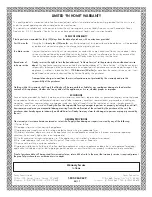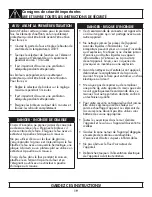
5
Important Safety Information
READ AND FOLLOW ALL SAFETY INSTRUCTIONS
SAVE THESE INSTRUCTIONS!
OVEN SAFETY REQUIREMENTS
Use care when opening the door. Allow hot air or
steam to escape before removing or replacing food.
Do not heat unopened food containers. Build up of
pressure may cause the container to burst and result
in injury.
Keep oven vents unobstructed.
Always place oven racks in the desired location
while the oven is cool. If the rack must be moved
while the oven is hot, do not let the pot holder
contact the hot heating element in the oven.
Do not use the oven if a heating element develops
a glowing spot during use or shows other signs
of damage. A glowing spot indicates the heating
element may fail and present a potential burn, fi re,
or shock hazard. Turn the oven off immediately and
have the heating element replaced by a qualifi ed
service technician.
Do not line the oven walls, racks or burner bowls
with aluminum foil.
Do not place shelves, pans, backing trays, broil
trays or other cooking utensils in the bottom of the
oven chamber. Always place on an oven shelf.
Never clean the oven with any high pressure steam
cleaning devices.
Do not leave anything on the top of the oven vent.
Never cover the oven vent opening with aluminum
foil or any other material.
COOK TOP SAFETY REQUIREMENTS
Use the proper pan size. This appliance is equipped
with four burners of different sizes. Select utensils
that have fl at bottoms large enough to cover
the surface of the heating element. The use of
undersized utensils will expose a portion of the
heating element to direct contact and may result in
ignition of clothing. Proper relationship of utensil to
burner will also improve effi ciency.
Never leave the appliance unattended while in use.
Boil over causes smoking and greasy spills can
ignite.
Never leave oil unattended while frying. If allowed
to heat beyond its smoking point, oil may ignite
resulting in fi re that may spread to surrounding
cabinets. Use a deep fat thermometer whenever
possible to monitor oil temperature.
To avoid oil spillover and fi re, use a minimum
amount of oil when shallow pan-frying and avoid
cooking frozen foods with excessive amounts of ice.
Ensure that refl ector pans or drip bowls are in
place. Absence of these pans or bowls during
cooking may subject wiring or components
underneath to damage.
Only certain types of glass, ceramic, earthenware
or other glazed utensils are suitable for range top
service without breaking due to sudden change in
temperature.
To reduce risk of burns, ignition of fl ammable
materials and spillage due to unintentional contact,
the handle of a utensil should be positioned so
that it is turned inward and does not extend over
adjacent burners.
Removable heating elements should never be
immersed in water.
Do not cook on broken cooktop. If the cooktop
should break, cleaning solutions and spill overs
may penetrate the broken cooktop and create a
risk of electric shock. Contact a qualifi ed technician
immediately.







































